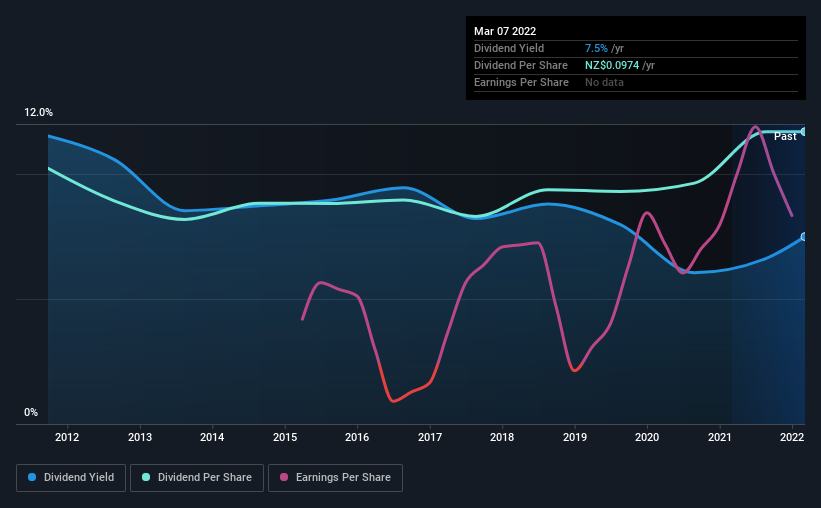Marlin Global's (NZSE:MLN) Shareholders Will Receive A Bigger Dividend Than Last Year
Marlin Global Limited's (NZSE:MLN) dividend will be increasing on the 25th of March to NZ$0.025, with investors receiving 13% more than last year. This makes the dividend yield 8.0%, which is above the industry average.
See our latest analysis for Marlin Global
Marlin Global's Payment Has Solid Earnings Coverage
We like to see robust dividend yields, but that doesn't matter if the payment isn't sustainable. Based on the last dividend, Marlin Global is earning enough to cover the payment, but the it makes up 234% of cash flows. While the company may be more focused on returning cash to shareholders than growing the business at this time, we think that a cash payout ratio this high might expose the dividend to being cut if the business ran into some challenges.
Looking forward, earnings per share could rise by 27.8% over the next year if the trend from the last few years continues. Assuming the dividend continues along recent trends, we think the payout ratio could be 35% by next year, which is in a pretty sustainable range.
Marlin Global Has A Solid Track Record
The company has a sustained record of paying dividends with very little fluctuation. The dividend has gone from NZ$0.085 in 2012 to the most recent annual payment of NZ$0.097. This works out to be a compound annual growth rate (CAGR) of approximately 1.4% a year over that time. While the consistency in the dividend payments is impressive, we think the relatively slow rate of growth is less attractive.
The Dividend Looks Likely To Grow
Some investors will be chomping at the bit to buy some of the company's stock based on its dividend history. It's encouraging to see Marlin Global has been growing its earnings per share at 28% a year over the past five years. Marlin Global is clearly able to grow rapidly while still returning cash to shareholders, positioning it to become a strong dividend payer in the future.
Our Thoughts On Marlin Global's Dividend
Overall, this is probably not a great income stock, even though the dividend is being raised at the moment. With cash flows lacking, it is difficult to see how the company can sustain a dividend payment. We would be a touch cautious of relying on this stock primarily for the dividend income.
Market movements attest to how highly valued a consistent dividend policy is compared to one which is more unpredictable. At the same time, there are other factors our readers should be conscious of before pouring capital into a stock. For example, we've picked out 1 warning sign for Marlin Global that investors should know about before committing capital to this stock. Looking for more high-yielding dividend ideas? Try our collection of strong dividend payers.
Have feedback on this article? Concerned about the content? Get in touch with us directly. Alternatively, email editorial-team (at) simplywallst.com.
This article by Simply Wall St is general in nature. We provide commentary based on historical data and analyst forecasts only using an unbiased methodology and our articles are not intended to be financial advice. It does not constitute a recommendation to buy or sell any stock, and does not take account of your objectives, or your financial situation. We aim to bring you long-term focused analysis driven by fundamental data. Note that our analysis may not factor in the latest price-sensitive company announcements or qualitative material. Simply Wall St has no position in any stocks mentioned.

 Yahoo Finance
Yahoo Finance 
